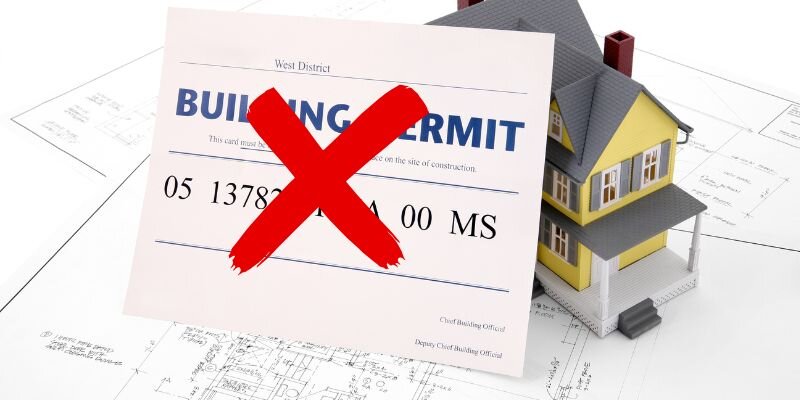
Understanding Unpermitted Work: A Guide for Homeowners
Sellers of Philadelphia real estate would do well to familiarize themselves with the laws regarding unpermitted work, since these violations can have a major influence on the selling of a property. If you’re planning to sell your house fast in Philadelphia, understanding these laws is essential. The term “unpermitted work” describes any kind of remodeling that does not have the appropriate permits issued by the relevant local authorities.
People who lived in older homes may have skipped official routes to save time or money, which leads to this problem. Philadelphia has strict building codes and rules that are meant to keep people safe and in line. If you don’t follow these rules, it could cause problems when you’re selling your home.
Buyers are becoming more wary of buying homes that have work done on them without a permit. This is because they could be sued and have to pay a lot of money to bring the home up to code in the future. First, homeowners should check their property for any changes that don’t have the right paperwork, like electricity upgrades, plumbing changes, or structural additions.
Talking to a real estate lawyer in Philadelphia who knows the laws can help you a lot with understanding how work that isn’t allowed could affect your deal. Getting retroactive permits or negotiating fixes before putting the house on the market can also ease buyers’ concerns and possibly raise the value of the property.
Addressing unpermitted work proactively helps smooth sales by minimizing surprises during inspections and ensuring compliance with city regulations.
Common Types of Unpermitted Work Found in Homes: An Overview
In Philadelphia, homeowners often encounter unpermitted work when selling their properties, which can complicate the transaction process. Common types of unpermitted work include basement renovations where egress windows or emergency exits were improperly installed, thus failing to comply with safety standards.
When people update their kitchens, they often don’t get the right permits to make changes to the plumbing and electricity. This can be dangerous and could even be against the law. Bathroom improvements that don’t have enough ventilation or waterproofing can get moldy and cause damage to the structure over time.
Decks and patios constructed without permits may not meet local zoning laws, affecting property lines and setback requirements. HVAC system installations or modifications often bypass necessary inspections, leading to inefficient systems that may not adhere to energy codes.
In older properties, doing electrical work yourself without the right licenses might make them more likely to catch fire because of how poorly they were installed. Homeowners should know that they need to deal with these unpermitted work before putting their home up for sale to avoid legal problems and make sure the sale goes smoothly with possible purchasers.
How to Identify Unpermitted Work in Your Home
When selling a home in Philadelphia, identifying unpermitted work is crucial to ensure a smooth transaction and comply with local regulations. Homeowners should start by examining their property records and comparing them with the current state of their home to spot any discrepancies.
Reviewing renovation documents, permits, and blueprints can reveal whether the city has approved all license and inspection modifications. Common signs of unpermitted work include mismatched electrical outlets, illegal plumbing alterations, or structural changes that do not align with the original plans.
Hiring a professional home inspector can also be helpful in identifying problems, as they are trained to spot changes that do not follow building rules. Understanding how our process works can give you clarity if you plan to sell a home with unpermitted work. If you are concerned about illegal building projects, it could be good to talk to neighbors who may have seen the work in progress.
Addressing unpermitted work proactively prevents legal complications and enhances buyer confidence during the sale process.
The Impact of Unpermitted Work on Property Value and Marketability

Unpermitted work can significantly influence a Philadelphia home’s value, often posing challenges during the sale process. Buyers are typically wary of homes with unpermitted renovations or additions, as these can lead to potential legal and safety issues.
This fear could make fewer people want to buy the home, which would make it harder to sell. Also, purchasers might not want to finance properties with undocumented work because they are taking on more risk, which might make the deal more difficult for both buyers and sellers.
The impact on property value is also notable; appraisers may undervalue a home with unpermitted modifications because these enhancements are not officially recognized in public records. This discrepancy can result in lower offers from prospective buyers who factor in the cost of rectifying or legalizing such work.
Moreover, encountering unpermitted work during inspections can lead to delays or even derail sales if either party requires corrective actions before closing. Sellers must proactively address these issues by retrospectively obtaining necessary permits or negotiating terms that accommodate potential risks for buyers.
Philadelphia’s Conditions: A Comprehensive Overview
Homeowners in Philadelphia must adhere to all rules and regulations, particularly those that pertain to the sale of properties with unpermitted work. The structural soundness, compliance, and safety of residential properties are guaranteed by these regulations.
When selling a home in Philadelphia, it’s important to know these rules so you don’t run into any legal problems or delays in the sale. The city’s Department of Licenses and Inspections makes sure that all work satisfies the standards set by these laws. They do this by requesting permits for changes, additions, or major repairs.
Selling a home with unpermitted work can complicate matters if the buyer requests proof of compliance or if discrepancies arise during inspections. Homeowners may need to retroactively obtain permits or rectify code violations before finalizing a sale.
Knowing the rules in Philadelphia can help with the sale and keep buyers and sellers from having to pay for unapproved modifications or improvements in the future.
Renovation and Permit Processes in Philadelphia Explained
Navigating the renovation and permit processes in Philadelphia can be complex, especially when dealing with unpermitted work when selling a home. In Philadelphia, any significant home improvement project, such as structural changes or major electrical and plumbing work, typically requires a building permit from the Department of Licenses and Inspections (L&I).
Not getting these permissions can make it harder to sell your home. Before putting your home up for sale, you need to fix this problem if any of the renovations were done without the right permissions.
You may need to apply for retroactive permits or make modifications to ensure compliance with local building codes. Understanding Philadelphia’s essentials, including when a permit is necessary, how to apply for one, and the potential penalties for non-compliance, is vital.
Engaging with licensed contractors familiar with the city’s requirements in this process helps avoid potential legal issues arising from any errors in the purchase. Following these steps ensures legal compliance and enhances the marketability of your property by providing peace of mind to prospective buyers.
Legal Implications of Selling a House with Unpermitted Work
It’s very important to know what the law says when you sell a house in Philadelphia that has work done without a permission. Unpermitted renovations or expansions could put buyers at risk and make them liable, so sellers need to be honest about any alterations that were made without the right permissions.
Philadelphia’s changes need permits to make sure they are safe and follow municipal rules. Not telling about work that wasn’t allowed can lead to lawsuits, fines, or delays in closing the sale.
Sellers should consider obtaining retroactive permits or adjusting the selling price to reflect potential issues. Furthermore, they should engage a real estate attorney familiar with these complexities, ensuring both parties know their rights and responsibilities in the transaction process. For more insights into the financial aspects of selling without an agent, read Understanding FSBO Costs For Home Sellers to plan effectively and maximize your net proceeds.
Disclosing Unpermitted Work When Selling Your Home: What You Need to Know
Disclosure is a very important step when selling a home in Philadelphia that had work done without a permit. It can have a big effect on the sale process. Sellers must be honest about any changes or upgrades that were made without the right permissions.
Failing to disclose unpermitted work can lead to legal complications and potential liabilities after the sale. In Pennsylvania, sellers must legally complete a property disclosure statement, including any known unpermitted work.
Potential buyers will trust you more if you tell them about these problems right away. This lets them make smart decisions and work out answers before the closing. Taking care of unpermitted work early on in the selling process can help avoid delays and make the deal go more smoothly. This will also help you follow local rules and keep the property’s value.
Steps to Legalize Unpermitted Renovations Before Selling
Before selling a Philadelphia home with unpermitted work, it is crucial to address the issue by legalizing the renovations. The first step involves hiring a licensed contractor or architect to assess the unpermitted work and determine what must be done to bring it up to code.
This professional evaluation will identify any safety hazards or compliance issues that need correction. Once this assessment is complete, you should apply for the necessary permits through the Philadelphia Department of Licenses and Inspections, ensuring all modifications adhere to local building codes.
It is very important to make detailed plans and records of the current job because they will be needed to get a permit. Once the permits are in hand, you can make any other changes or additions that are needed to meet legal requirements.
Hiring a qualified inspector to review completed renovations can ensure that everything complies with city regulations. By following these steps and addressing unpermitted renovations properly, sellers can avoid potential legal complications and enhance the property’s landscape.
Navigating Real Estate Transactions Involving Unpermitted Work

Sellers and purchasers in Philadelphia real estate transactions involving unpermitted work need to be aware of the potential consequences for the sale process. Houses that have had renovations or alterations done to them without the appropriate licenses can be more difficult to sell in the market.
Sellers must disclose any unpermitted work to potential buyers, as failing to do so can lead to legal complications or delays. If you need to sell your house fast in Drexel Hill, addressing these issues upfront can help avoid surprises during closing. Buyers should also be aware of the risks of purchasing a property, including unpermitted modifications, such as potential safety hazards or difficulties obtaining insurance and financing.
For the benefit of all parties involved, it is vital to hire a real estate agent with expertise in Philadelphia. Buyers can get advice on how to calculate the potential effect of unpermitted work on a property’s value, and sellers can get help with properly fixing or disclosing such work.
Consulting with a real estate attorney might also be necessary to navigate legal responsibilities and protect your interests during negotiations. Understanding local building enforcement policies can help avoid fines or penalties for unauthorized construction work as you proceed with the transaction.
Negotiating Repairs and Permits in Real Estate Deals with Unpermitted Work
Negotiating repairs and permits becomes a critical aspect of the real estate transaction when selling a Philadelphia home with unpermitted work. Homeowners must identify unpermitted modifications and understand how these might affect the property’s seal.
It is crucial to work with an experienced real estate agent who can advise you on the best course of action based on their expertise of the local market. The buyer has the option to ask the seller to remedy the unpermitted work by acquiring retroactive permits or by providing credits to offset possible future expenses.
Sellers should be prepared to negotiate repairs, considering factors such as the extent of the unpermitted work and its impact on safety or compliance with building codes. Philadelphia also plays a crucial role, as it can significantly impact the timelines and costs of bringing the work to code.
Collaborative negotiations often lead to mutually beneficial solutions, enabling buyers to feel confident in their investment while allowing sellers to proceed smoothly with the sale.
The Role of Home Inspections in Detecting Noncompliant Construction
Home inspections are critical in identifying noncompliant construction when selling a Philadelphia home, especially if there is unpermitted work. A thorough inspection can uncover issues such as electrical, plumbing, or structural modifications not completed according to code or without the necessary permits.
These assessments alert sellers to potential legal liabilities and provide an opportunity to address problems before listing the property. Inspectors meticulously examine every aspect of the home, ensuring compliance with local building codes and safety standards.
Home inspections help prevent future buyer disputes over undisclosed issues by identifying discrepancies between current conditions and legal requirements. Knowing these subtleties helps Philadelphia homeowners make transactions go more smoothly by enabling sellers to address noncompliant items or engage in productive negotiations during the sale process.
Insurance Considerations for Houses with Unauthorized Modifications
Understanding insurance considerations becomes crucial when selling a home in Philadelphia with unpermitted work. Homeowners may perceive unauthorized modifications to their policies as heightened risks.
Reviewing your current policy to determine if it covers unpermitted alterations and to disclose any unauthorized work to potential buyers and insurers is essential. Failing to do so could result in claim denials or policy cancellations.
Homebuyers might also face challenges securing insurance for properties with unapproved renovations, which could impact their mortgage approval process since lenders typically require proof of adequate coverage. To mitigate these issues, sellers should consider obtaining a professional inspection to assess the safety and compliance of the modifications and possibly negotiate remediation or retroactive permitting before listing the property.
Consulting with an experienced real estate attorney can provide valuable legal insights into navigating these complexities while ensuring that the seller and buyer are protected throughout the transaction process.
Evaluating the Cost-Benefit of Correcting Versus Leaving Unpermitted Work
When navigating the sale of a Philadelphia home with unpermitted work, evaluating the cost-benefit of correcting versus leaving the unpermitted work is crucial. Homeowners must assess whether rectifying the unpermitted renovations will sufficiently increase the property’s value.
Correcting unpermitted work can lead to fewer complications during inspections and appraisals, potentially expanding the pool of prospective buyers whom compliance issues may otherwise deter. On the other hand, leaving unpermitted work as-is could save upfront costs but may necessitate price reductions or concessions during negotiations if buyers perceive significant risks or future liabilities.
Additionally, sellers must consider legal implications, such as potential fines or mandatory corrections imposed by city authorities if discovered during the sale process. Weighing these factors carefully helps homeowners decide whether pursuing permits and alterations will yield a more favorable financial outcome than selling the property with existing noncompliant features.
The Future of Housing Regulations and Their Impact on Home Improvements
As housing regulations continue to evolve, homeowners in Philadelphia considering selling a property with unpermitted work must stay informed about the potential impact on home improvements. Future housing regulations may impose stricter requirements for obtaining permits and inspections, making it essential for sellers to understand how these changes could affect their property’s
With the property’s emphasis on safety and compliance, unpermitted work might need rectification before a sale can proceed smoothly. Potential buyers are becoming more aware of the implications of purchasing homes with unpermitted modifications, which can lead to increased scrutiny during transactions.
Regulatory shifts could also influence the types of improvements that require permits and streamline processes for addressing existing unpermitted work. Staying abreast of these developments is crucial for sellers to ensure their properties meet new standards and avoid legal complications.
By understanding how future regulations might shape home improvement practices, Philadelphia homeowners can better navigate the complexities involved in selling a home with past unauthorized renovations.
Can You Sell a House with Unpermitted Work in Pennsylvania?

In Pennsylvania, selling a house with unpermitted work is indeed possible. Still, careful navigation is required to ensure compliance with legal requirements and to protect both the seller and the buyer. Unpermitted work in the seller’s home or the seller’s renovations or additions completed without obtaining the necessary permits can complicate the sale process.
Working with potential buyers upfront is critical for preserving transparency and avoiding legal issues later. In some cases, sellers might consider obtaining retroactive permits or negotiating repairs or adjustments with buyers as part of the sale agreement.
Engaging a knowledgeable real estate agent familiar with Philadelphia and Pennsylvania can be valuable in managing properties. The Swift Cash House Buyer Team can help you navigate selling a property with unpermitted work confidently. Additionally, a co-further attorney can offer legal advice for addressing any ramifications associated with unpermitted work while ensuring a smooth transaction process.
Properly addressing these issues facilitates a successful sale and safeguards against future disputes or liabilities related to undisclosed property conditions.
Can You Sell a House as Is Without Inspection in PA?
When selling a house, it is crucial to understand if the property has unpermitted work. In Pennsylvania, you can sell a home “as is” without repairs or improvements.
However, the permit process does not exempt you from disclosing known defects or unpermitted work. While an inspection isn’t necessary, potential buyers are unlikely to conduct their assessments to assess the property.
Sellers must accurately complete a seller’s form, including any structural problems or non-permitted renovations. Failure to disclose known issues can lead to legal repercussions post-sale.
Sellers should consult a real estate attorney familiar with Pennsylvania law to navigate these complexities and ensure compliance with all disclosure requirements. Understanding these nuances helps sellers manage buyer expectations and mitigate potential legal risks when selling their product.
Helpful Philadelphia Blog Articles
- Tips For Selling Your Inherited House In Philadelphia, PA
- Who Pays For Home Appraisals And Inspections In Philadelphia, PA
- Removing Your Name From A Mortgage After Divorce In Philadelphia, PA
- Sale Of A Philadelphia, PA, Home With Unpermitted Work
- Understanding FSBO Costs For Home Sellers In Philadelphia, PA
- Divorce Home Appraisal In Philadelphia, PA
- Prevent House Foreclosure In Philadelphia, PA
- Inheriting A House With Siblings In Philadelphia, PA
- Homeowners Insurance When Selling Your House In Philadelphia, PA
- Rules For Leaving A House Vacant in Philadelphia, PA
- Philadelphia, PA, Property Managers
- Selling Your Inherited House In Philadelphia, PA
- Philadelphia, PA Neighborhood Map
- Philadelphia, PA Cost of Living
- Fun Facts About Philadelphia, PA

| REAL ESTATE AGENTS | REAL ESTATE AGENTS | REAL ESTATE AGENTS | REMODELING | JURISDICTIONS | LENDING |
| LIABILITY | LEGAL LIABILITY | HOME RENOVATION | CASH | MARKETING | FRAUD |
| BUDGET | BREACH OF CONTRACT | BLOG |
